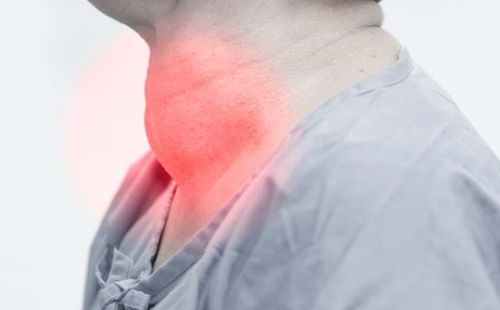The surgical procedure to remove an enlarged thyroid gland. The thyroid gland is located in the front part of the neck. Goiter, the enlargement of the gland, can cause breathing or swallowing problems. Goiter surgery is performed to reduce this pressure and alleviate the symptoms. It is performed under local or general anesthesia. A short hospital stay is required after the procedure. The recovery process after the surgery can take a few weeks.
In Which Situations is Goiter Surgery Performed?
 An excessively enlarged thyroid gland puts pressure on the trachea or esophagus. This can cause breathing and swallowing problems. In this case, part or all of the thyroid gland is removed through surgery. Cystic structures or nodules can form in goiter. If these structures grow rapidly, cause aesthetic issues, or carry a cancer risk, goiter surgery may be necessary. In cases where the thyroid gland produces too much hormone, some drug treatments may be insufficient. In such cases, surgery is performed to prevent excessive hormone production by the thyroid. Surgery is necessary if there are suspicious or cancerous cells in the thyroid. This can prevent the spread of cancer. Some patients may desire surgery for aesthetic reasons if the enlarged goiter creates an unsightly appearance in the neck area. After goiter surgery, regular monitoring of thyroid hormones may be required. In some cases, hormone therapy may be necessary.
An excessively enlarged thyroid gland puts pressure on the trachea or esophagus. This can cause breathing and swallowing problems. In this case, part or all of the thyroid gland is removed through surgery. Cystic structures or nodules can form in goiter. If these structures grow rapidly, cause aesthetic issues, or carry a cancer risk, goiter surgery may be necessary. In cases where the thyroid gland produces too much hormone, some drug treatments may be insufficient. In such cases, surgery is performed to prevent excessive hormone production by the thyroid. Surgery is necessary if there are suspicious or cancerous cells in the thyroid. This can prevent the spread of cancer. Some patients may desire surgery for aesthetic reasons if the enlarged goiter creates an unsightly appearance in the neck area. After goiter surgery, regular monitoring of thyroid hormones may be required. In some cases, hormone therapy may be necessary.
How is Goiter Surgery Performed?
 The surgery is performed under general anesthesia. This way, the patient sleeps and feels no pain throughout the procedure. The surgeon reaches the thyroid gland by making an incision at the bottom of the neck. The length of the incision may vary depending on the size of the goiter and whether the entire thyroid gland or just a part of it will be removed. Depending on the size of the goiter, the number or type of nodules, part (lobectomy) or all (total thyroidectomy) of the thyroid gland is removed. During this procedure, delicate structures like the nerves that protect the vocal cords and the parathyroid glands are preserved as much as possible. After the thyroid gland is removed, the surgeon closes the incision area with stitches. To achieve good aesthetic results, stitches are usually made small and fine. In some cases, a drain is placed to prevent fluid accumulation after goiter surgery. The patient is kept under observation for a few hours or days. Although the recovery time varies from person to person, the patient can usually return to daily life within 1-2 weeks. However, some patients may need to take hormone supplements after surgery. The operation is an important step in controlling thyroid diseases or goiter symptoms. It is usually successfully performed with low risk.
The surgery is performed under general anesthesia. This way, the patient sleeps and feels no pain throughout the procedure. The surgeon reaches the thyroid gland by making an incision at the bottom of the neck. The length of the incision may vary depending on the size of the goiter and whether the entire thyroid gland or just a part of it will be removed. Depending on the size of the goiter, the number or type of nodules, part (lobectomy) or all (total thyroidectomy) of the thyroid gland is removed. During this procedure, delicate structures like the nerves that protect the vocal cords and the parathyroid glands are preserved as much as possible. After the thyroid gland is removed, the surgeon closes the incision area with stitches. To achieve good aesthetic results, stitches are usually made small and fine. In some cases, a drain is placed to prevent fluid accumulation after goiter surgery. The patient is kept under observation for a few hours or days. Although the recovery time varies from person to person, the patient can usually return to daily life within 1-2 weeks. However, some patients may need to take hormone supplements after surgery. The operation is an important step in controlling thyroid diseases or goiter symptoms. It is usually successfully performed with low risk.
Postoperative Care After Goiter Surgery
 Resting for the first few days after surgery helps the body recover. Avoiding strenuous activities speeds up healing. Keeping the operation site clean and performing recommended dressings is important. If redness, pain, or swelling is noticed in the wound area, a doctor should be consulted immediately. Soft and liquid foods should be preferred as swallowing may be difficult. It is also recommended that meals are not too hot or cold. In addition, attention should be paid to iodine balance. Mild pain after goiter surgery is normal, and painkillers prescribed by the doctor can be soothing during this period. However, if severe pain is felt, a doctor should be consulted. Hoarseness or changes in voice may occur after surgery. In this case, the voice should be rested and allowed to heal without strain. The medications prescribed by the doctor should be used regularly. In addition, if thyroid hormone medications are necessary, the doses should be carefully followed. Postoperative doctor visits should not be skipped. These check-ups are important for monitoring the recovery process. Symptoms like fever, severe pain, or infection at the wound site could indicate an infection. In such cases, a doctor should be consulted immediately. Following these recommendations speeds up the recovery process after goiter surgery and prevents complications.
Resting for the first few days after surgery helps the body recover. Avoiding strenuous activities speeds up healing. Keeping the operation site clean and performing recommended dressings is important. If redness, pain, or swelling is noticed in the wound area, a doctor should be consulted immediately. Soft and liquid foods should be preferred as swallowing may be difficult. It is also recommended that meals are not too hot or cold. In addition, attention should be paid to iodine balance. Mild pain after goiter surgery is normal, and painkillers prescribed by the doctor can be soothing during this period. However, if severe pain is felt, a doctor should be consulted. Hoarseness or changes in voice may occur after surgery. In this case, the voice should be rested and allowed to heal without strain. The medications prescribed by the doctor should be used regularly. In addition, if thyroid hormone medications are necessary, the doses should be carefully followed. Postoperative doctor visits should not be skipped. These check-ups are important for monitoring the recovery process. Symptoms like fever, severe pain, or infection at the wound site could indicate an infection. In such cases, a doctor should be consulted immediately. Following these recommendations speeds up the recovery process after goiter surgery and prevents complications.


